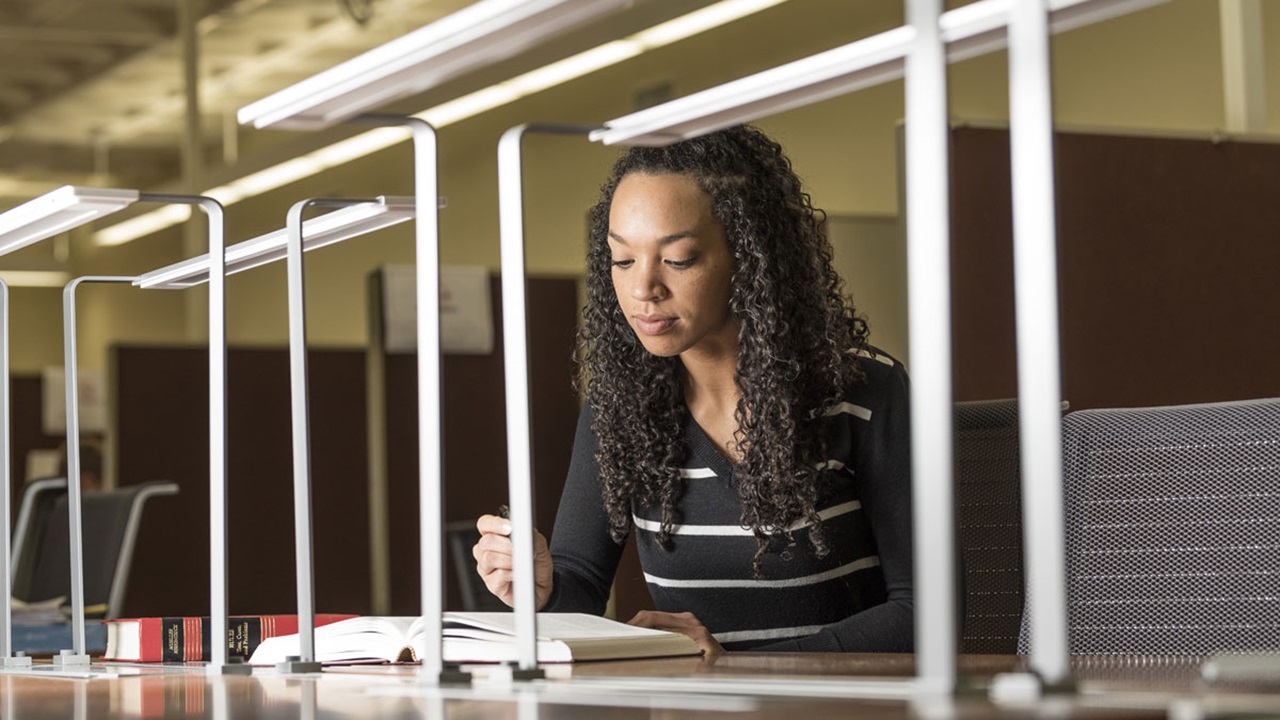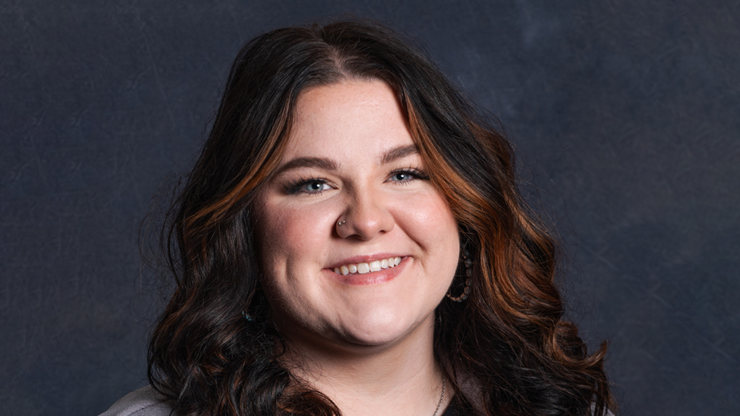Hess' Legal Writing Course Services as Integral Basis for all Students

“I didn’t know how much I appreciated it until I got out into practice,” Hess said.
But as associate professor and director of the legal writing program at the University of South Dakota School of Law, Hess gets to see firsthand how a basic first-year class comes to shape future lawyers.
“It’s just fun to watch them develop throughout law school,” she said.

Hess has been immersed in law for more than two decades. After graduating from the University of Maryland with a bachelor’s degree in psychology, she enrolled at the University of Denver School of Law, earning her Juris Doctor in 1998. Prior to the start of her teaching at USD in 2014, Hess directed the Prison Reform Project at the Public Justice Center in Baltimore, Maryland, working on educational access for children in foster care. She has also worked on cases involving poverty law and civil rights.
“It was really satisfying,” Hess said.
Tools of the Trade
So, what is legal writing, anyway? Essentially, it involves writing a persuasive or analytical outlook of the facts of a case. It’s also one of the foundations of a law education.
“It’s a very practical course that teaches students what type of writing and analysis attorneys and judges expect in a legal document,” Hess said. “Students are learning a new language and getting to know a new audience.”
In class, students are given fictional clients and scenarios and practice conducting legal research before beginning the writing process. In the second semester of the year-long class, they deliver oral arguments before both trial and appellate judges. “You’ve learned how to write, you’ve learned how to analyze and then you get up and you have to articulate it to someone, which can sometimes really make it all gel,” Hess said.
The Fundamental Legal Skills program is not just a writing course. “In order to write like lawyers, students must first learn to think like lawyers,” Hess explained. “It’s writing, but it’s also trying to teach them the particular kind of analysis that lawyers go through,” she said.
A New Challenge
Baylie Moravec is a first-year law student at USD who took Hess’ legal writing class. “We basically studied how to be concise in legal arguments and how to really craft an argument, and show not just one side, but both sides, and be able to persuade an audience,” she explained. Having graduated with a bachelor’s degree in history, Moravec said it was a challenge to learn how to write like a lawyer.
“Crafting a legal argument is a lot like crafting a piece of art,” she said. “It’s everchanging and very subjective.”
Grammar and punctuation are crucial, Hess said, and the amount of research and fact-checking that goes into writing legal briefs and memos can be a struggle for new law students.
“You don’t just sit down and write something that flows,” she said. “It’s more like assembling a puzzle, and so that can be a shock to someone who has been accustomed to sitting down and writing something quickly and easily.”
But legal writing doesn’t necessarily have to be boring, Hess says.
“You can, within the confines of legal writing, make it enjoyable and interesting to read and sort of tell a story about your client,” she said. “It’s kind of fun, in that sense. The challenge and strategy involved in legal writing can make the experience more enjoyable, even if not always an easy task.”
Preparing for the Future
Even before students graduate, they’re going to have an opportunity to take their legal writing skills out into the real world. Many students will complete summer legal internships after their first year, where they will research and write memos and communicate their findings to their employers.
Moravec can already see how she will use what she has learned in her legal writing class in her future career as a corporate attorney. “That’s all drafting contracts and legal documents and memorandums, so this class is especially important because it’s going to be a skill that I’ll use in my career up until retirement,” she said.
For Moravec, part of what made her legal writing class a valuable experience was the person teaching it.
“Legal writing is an incredibly hard thing to do in your first year; it’s unlike anything else you’ve ever written,” Moravec said. “So, Professor Hess’ patience, understanding and compassion as a professor to make sure you’re learning was just an incredible experience to have.”
This is Hess’ eighth year teaching the class, and she says she really enjoys refining and shaping it to help students become better and better at legal writing.
“I joke that I’ll retire when I’ve finally taught the perfect semester, which will never happen,” she said. “But you can always make it better; you can always improve a class or an assignment.”
Equipping Students to Succeed
In addition to teaching Fundamental Legal Skills, Hess also teaches a summer pre-law program for Native American students. The Pre-Law Summer Institute is sponsored by the American Indian Law Center and held at the University of New Mexico School of Law. She was introduced to the program by retired USD School of Law professor Frank Pommersheim, who taught the course for many years.
"You can, within the confines of legal writing, make it more enjoyable and interesting to read and sort of tell a story about your client. It's kind of fun, in that sense. The challenge and strategy involved in legal writing can make the experience more enjoyable, even if not always an easy task." - Wendy Hess
The goal of the eight-week intensive course is to help prepare Native American undergraduate students for the rigors of law school by teaching them to research, analyze and write for a legal audience.
“I teach a really condensed version of what we do throughout the year here,” said Hess, who began teaching the course in 2018. “It helps give them some acclimation to what they’re going to get into and maybe a little more confidence and tools to use, so it’s really an amazing program.”
With only 1.7% of lawyers identifying as Native American, Hess said she feels it is important to help empower Native American law students to pursue their goals of achieving their J.D.s. Many students desire to use their legal knowledge to assist their tribes, Hess said. “I notice a lot of them want to do that, and I find it exciting to help equip them with those tools, to use them however they want to make the world a better place,” she said.
Hess’ goal of helping Native American students succeed in their law educations mirrors efforts by the USD School of Law. The university hosts organizations like the Native American Law Student Association (NALSA), which provides resources and focuses on issues in Indian law and offers several scholarships specifically for Native students.
“I love teaching all students, of course, but I find it particularly satisfying to help diversify the profession,” Hess said. “The legal profession benefits if its members come from different backgrounds and can add new perspectives.”
Advice for Future Students
When asked what pieces of knowledge she would pass along to future Legal Writing students, Moravec said patience is key.
“It’s most important to take your time and be patient with the process, and trust that your professors are giving you the information that’s going to be most useful, even if you don’t understand it at the time,” she said.
Having a great professor also makes the class more enjoyable in addition to being more useful in a student’s law school career, Moravec said.
“As far as her class goes, it’s probably going to be the most important foundational class for your legal career that you can take,” she said. “We were learning a lot of different subjects our first year, which all law students will have to do. But all those subjects have one common denominator, and that’s being able to write about them. So, if you don’t know how to craft your argument, that knowledge and other skills will go to waste.”
But Moravec enjoyed having Hess as a professor for more than just her teaching style. “Professor Hess is an invaluable resource,” she said. “She gives great career advice, she gives great life advice and she’s always there for her students to listen.”
On Hess’ part, her teaching career is not just a job, but a way she can help law students make a difference in the world.
“I view them as my future colleagues,” Hess said, “and it’s an honor to equip them with tools to go out into the legal profession.”

